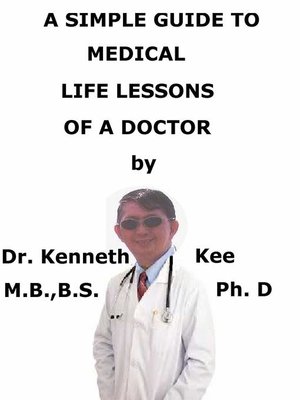
Sign up to save your library
With an OverDrive account, you can save your favorite libraries for at-a-glance information about availability. Find out more about OverDrive accounts.
Find this title in Libby, the library reading app by OverDrive.



Search for a digital library with this title
Title found at these libraries:
| Library Name | Distance |
|---|---|
| Loading... |
This book describes Medical Life Lessons of a Doctor from the Diagnosis and Treatment of Diseases
Skills and Passion
More than just being book-smart, patients want a doctor who is talented at what they do
The Art of Observation Sir Arthur Conan Doyle the author based his Sherlock Holmes character on a Dr Joseph Bell a famous lecturer in the University of Edinburgh who was famous for his ability to deduce the patient's occupation and recent illness just through observation of the patient.
Dr Joseph Bell was not only an excellent diagnostician but also an extremely good teacher. Dr. Bell observed the way a sailor walked was completely different from that of a soldier.
Also the tattoos on a sailor might assist him in knowing where the sailor may have travel to.
By listening to for small differences in a patient's accents help him identify where they were from.
In addition observation of the calluses or other marks of the hands of his patients could help him determine their occupation. "In teaching the treatment of disease and accident," Dr. Bell stated, "all careful teachers have first to show the student how to recognize accurately the case.
The recognition depends in great measure on the accurate and rapid appreciation of small points in which the diseased differs from the healthy state.
In fact, the student must be taught to observe.
To interest him in this kind of work we teachers find it useful to show the student how much a trained use of the observation can discover in ordinary matters such as the previous history, nationality and occupation of a patient." As a medical student in our local University, this importance of observation was particularly emphasized by a story about our own Professor of Medicine Gordon Arthur Ransome.
Apparently he was making a ward round with a group of medical students and stopped at a bed of a patient with diabetes.
He asked the students "What is the best way to diagnose diabetes in a patient?" Before they could answer him, he dipped his finger into the patient's bottle of urine and licked a finger in front of his horrified medical students.
"That is how you diagnose diabetes by tasting his urine."
The students followed his action only to be told that he has dipped one finger into the urine and another finger into his mouth.
Professor Ransome was teaching the students on the importance of observation as one of the important lessons in medicine. "I want you to spend time to observe and establish rapport with your patient and show the patient that you are more interested in him as a person and not just as a patient"
Professor Ransome
Curiosity and Methodology
Good doctors are curious.
A good doctor should be eager to work to determine what is going on.
The doctor tells the patient what he or she needs to know clearly and in a forthright fashion.
Listening Being a good listener is critical to being a good doctor
Listening skills are important in getting a history from patients and also in social life.
A listening ear is always needed by most people who has problems at home and at work.
Always look direct into the patients' eye when you are listening. Communication
Good doctors are good communicators
In order to treat and diagnose a patient it is important to communicate with the patient well. Treat every patient with the respect you would want them to show to you. When it is their turn to enter the consultation room, call them by their name rather than by a number.
This is a person that you are dealing with you, not a case.
TABLE OF CONTENT
Introduction
Chapter 1 Skills...







